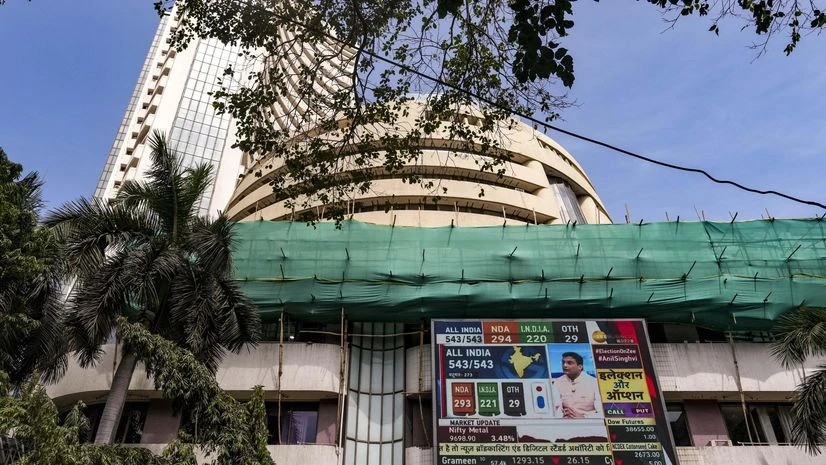Risks for Indian stock markets: The Indian stock markets are set to culminate the first six months of calendar year 2024 (H1 CY24) with notable gains.
Thus far in the current calendar year, the benchmark Sensex, and Nifty50 indices have rallied 9.7 per cent and 10.7 per cent, respectively, fending off the 2024 Lok Sabha elections' result, Israel-Gaza/Ukraine-Russia war, and the March quarter earnings.
In addition to this, the broader Nifty Mid, and SmallCap indices braved the market regulator Securities and Exchange Board of India (Sebi's) warnings against rich valuations early this year.
Yet, the indices have logged double the gains seen on benchmarks with a 20-per cent year-to-date (YTD) rise in the gauge of mid-cap stocks and 20 per cent YTD jump in the index tracking small-cap stocks on the National Stock Exchange (NSE).
Going ahead, however, analysts said investors need to adopt a cautious approach as headwinds, including any delayed interest rate cut and below-par monsoon, may challenge the current market rally in the second half of CY-2024 (H2 CY24).
Against this, here are the key risks for the Indian stock market in H2 CY24:
Weak monsoon: According to Ajit Mishra, senior vice president for research at Religare Broking, a weak monsoon can decrease agricultural output, reducing rural incomes and consumer spending.
This, he said, could impact companies in sectors like consumer goods, fertiliser, and automobile, leading to overall market volatility.
More From This Section
At present, there is a 19 per cent rain deficiency over the country with 57 per cent rain deficiency over northwest India; 23 per cent over central India; 16 per cent over east and northeast India; but 9 per cent excess over peninsular India, as per private weather forecasting agency Skymet.
'Populist' Budget 2024: A populist budget with increased government spending on social programs and subsidies may exert additional pressure on the fiscal balance, leading to higher deficits and potentially impacting long-term economic stability and market confidence, analysts said.
The interim Budget has pegged the fiscal deficit at 5.1 per cent of the gross domestic product (GDP) in FY25, down from 5.8 per cent seen in FY24 (revised estimate).
Sticky inflation and delayed interest rate cuts: Persistently high inflation, according to market watchers, could lead to tighter monetary policy, including higher interest rates, which may dampen economic growth, corporate earnings, reduce liquidity, and lead to higher borrowing costs.
"Additionally, any delays in rate cuts by the US Federal Reserve (US Fed) could continue to exert pressure on global financial conditions," said Nirav Karkera, Head-Research, Fisdom.
Low risk appetite, rich valuations: Any contraction in global risk appetite may lead to exacerbated outflows by foreign investors, which may dent the stock market rally amid expensive valuations, said Deepak Jasani, head of retail research at HDFC Securities.
Slowdown in corporate earnings: Any earnings disappointment, said Gaurang Shah, senior vice president, Geojit Financial Services, may lead to valuation multiples' correction.
India Inc will begin announcing the April-June quarter results for financial year 2024-25 (Q1 FY25) by mid-July. Sub-par earnings results or downward revisions in earnings forecasts, analysts added, could negatively affect stock prices.
Global economic slowdown: Signs of a slowdown in major economies such as the US, China, and the Eurozone, Ajit Mishra of Religare Broking believes, could negatively impact investor sentiment and reduce capital flows into Indian markets.
Besides, it may impact export demand, foreign investments, and overall market sentiment in the market.
Regulatory changes: Changes in regulations affecting key sectors, such as banking or healthcare, can impact market dynamics. Unpredictable or stringent regulatory measures may create uncertainty for businesses and investors, analysts cautioned.
Other risks: Apart from the above mentioned risks, analysts said unforeseen events like escalation in geopolitical tensions, especially involving key trading partners or economically significant regions for India, may lead to market volatility.
Fluctuations in oil prices and Indian Rupee may also affect fiscal balance for the country, denting market sentiment, analysts added.
The outcome of the US Presidential elections, they added, may not significantly affect the Indian stock markets as both, Joe Biden and Donald Trump, may remain 'friendly' with India.

)